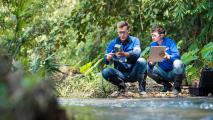Extreme weather events, critical changes to Earth systems, biodiversity loss and ecosystem collapse are the top long-term risks featured in the 2024 Global Risks Report.
These risks are inter-connected and propelled by the climate crisis. Higher temperatures catalyse abrupt and irreversible changes to Earth systems and fuel more extreme weather events, which in turn trigger collapses in ecosystems that are not well adapted. For example, scientists estimate that 99% of coral reefs will not survive a 1.5°Celsius world, yet this threshold will be crossed in nearly all IPCC scenarios in the early 2030s. Indeed, we have a sense of that world already from 2023’s El Nino year, which is the hottest in recorded history.
These risks are also mutually reinforcing. For example, coral reefs offer an effective barrier to extreme weather from coastal storm surges – so the loss of these ecosystems propels higher costs of extreme weather for many seaboard towns and cities. As a quarter of all marine life are dependent on coral reefs at some point in their life cycle, their loss also affects the composition of ocean ecosystems and coastal food security. Some 10% of the world’s population are dependent on the ocean for readily accessible protein – affecting the lives and livelihoods of humans across the planet.
Our relationship with nature and the climate
In Jared Diamond’s Collapse: How Societies Choose to Fail or Succeed, he outlines a five-point framework that explains why humans have destroyed their lives and societies throughout history.
Three of the five are related to our relationship with nature and the climate: environmental damage, climate change and society’s inability to respond to environmental risks. They reflect the results of the Global Risk Report this year and highlight the gravity of our current situation. Low-latitude coral reefs are just one of 16 climate tipping points. Five important natural thresholds already risk being crossed, according to the recently released Global Tipping Points report, and three more may be reached in the 2030s if the world heats 1.5°C above pre-industrial temperatures. Indeed, six of our nine planetary boundaries have been transgressed, and our window of action to maintain a safe and just pathway is vanishingly small.
Humanity is facing an existential threat to the ability of life – including human life – to survive.
Maintaining optimism we can and will succeed
We are both the species that caused the climate crisis and we are uniquely positioned to respond to avert its worst consequences. The future of life on our planet is in our hands, and the way our current generation reacts will determine the nature of life following this mass extinction event. Informing our best possible response is one of the biggest challenges and opportunities of our time.
When confronted with an existential threat, it is essential to understand the reality we are facing. Not doing so, leads decision-makers to a misguided perception of the problem and so poorly crafted, short term and often linear solutions. On the other hand, maintaining a fixed focus on the threat leaves the human psyche with a trauma response of fight, flight, freeze and fold – inducing inaction and propelling rather than mitigating risk.
In the words of James Stockdale, who faced his own existential crisis in a prisoner of war camp in Vietnam: “You must never confuse faith that you will prevail in the end — which you can never afford to lose — with the discipline to confront the most brutal facts of your current reality, whatever they might be.”
He observed that those prisoners who were too optimistic without understanding their reality died because they got discouraged. So did those caught in a trauma response of inaction. The small group of prisoners who survived managed to pair a fully informed perspective with unconditional optimism.
Pathways towards a better future
The World Economic Forum’s Centre for Nature and Climate launches today Earth Decides, a community of 35 world-class experts and influencers looking to cultivate informed optimism among public, private and philanthropic leaders. By understanding the hard truths of our reality, and maintaining the belief that we can and will succeed in creating a better future than our current status quo, we move towards a better future. Decision-makers are empowered to craft calibrated responses and form hitherto unprecedented collaborations to address the realities of this wicked problem.
By working with global communication experts, and harnessing both ancient and novel communication tools and approaches informed by evidence, the community seeks to inform and collaborate with world leaders in the cultivation of appropriate and effective industry and societal response pathways. Priorities include rapid mitigation of carbon emissions, strategic foresight to develop networked adaptation, loss and damage mechanisms, and the informed processing of climate anxiety and grief – which are normal responses to existential threat.
The community sets its own agenda each year, informed by the perspectives of indigenous wisdom traditions, the latest science, and the lived experience of those living on the grassroots level who are experiencing unprecedented adaptation challenges, loss and damage.
At this year’s 2024 Annual Meeting, we will have 12 members of the community present in person to share perspectives on panels and closed-door discussions across the programme. Keep track of their interventions using the links below. The Climate Tipping Points Hub will also launch in the Global Collaboration Village, a World Economic Forum initiative in partnership with Accenture and Microsoft, to showcase the latest evidence and encourage informed discussions using next-generation metaverse technology.
This article is republished from the World Economic Forum under a Creative Commons license. Read the original article.






